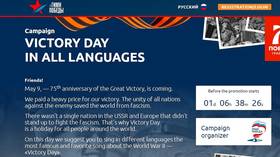Hitler would've loved the Covid-19 blame games. Let's not let the pandemic spoil Victory Day

Three-quarters of a century since a globe-spanning coalition defeated Hitler’s dreams of a world empire, the spirit of 1945 is nowhere to be found as each country copes with Covid-19 more or less alone. How did it come to this?
Adolf Hitler intended his Reich to last a thousand years, but it met a bloody end after just twelve. Five days after US and Soviet forces linked up on the Elbe River, he committed suicide in the ruins of Berlin before the advancing Red Army captured his bunker. A week later, the remnants of the Nazi regime laid down their arms before the victorious allies.
One of the things that reportedly kept Hitler going, after the tide of war turned in 1943, was his belief that the alliance between the British Empire, the American republic, and the Soviet Union would collapse due to their intrinsic differences, giving him a reprieve. He ended up underestimating the allies’ determination to finish him off first – and only then fall out with each other, resulting in the Cold War.
Fast-forward to 2020. With all the surviving veterans in their 90s, this is perhaps the last major occasion on which the war would still be a living memory. Yet the celebrations of the May 1945 victory have all been canceled or scaled down, due to the coronavirus pandemic.
Ironically, leaders around the world have compared the Covid-19 outbreak to war – and not just any war, but WWII in particular. US President Donald Trump has called it an attack “worse than Pearl Harbor,” the 1941 Japanese strike that brought Washington into the conflict. To keep Britons under lockdown, UK media have invoked the spirit of the Blitz and Battle for Britain. German Chancellor Angela Merkel of all people described the unprecedented suspension of civil rights in response to the pandemic as the “greatest challenge” to Germany “since World War II.”
One would think an enemy of that caliber might require a return to the spirit of ‘45 and be defeated through international cooperation. What happened instead would have pleased Hitler. When Russia sent aid to Italy – which was hit the hardest by the initial outbreak of the virus in Europe – in March, it was denounced by pro-NATO media and think tanks as an “influence operation” intended to somehow divide the West.
Also on rt.com Russian aid to Italy, dubbed an ‘influence operation’ by EU-partnered media outfit, is indeed shameful — for EuropeMeanwhile, NATO itself did nothing to help its members, and the European Union – ostensibly the embodiment of progress from the evil nationalisms of the 1940s – left Italy and Spain to their own devices. Brussels sent some aid only after Rome thanked Russia, China and Cuba for their efforts, effectively shaming the EU into action.
While leaving its member states at the mercy of the virus, the EU chose to focus on producing a slick – and fraudulent – report in its propaganda shop, accusing Moscow of “looking to destabilize the West with a coronavirus disinformation campaign.” Priorities, you know.
Not to be outdone, the US also got into the propaganda blame game – though its wrath was directed at China. Belittling China’s help to the US and other virus-stricken nations, Washington has accused Beijing of covering up the true threat of Covid-19 and unleashing it onto the world.
The closest the US came to the one-time alliance was the expressed willingness of the Trump administration to work with Russia. Even such Russia hawks as Secretary of State Mike Pompeo were all about the cooperation this time.
Even so, when a planeload of Russian aid came to the virus-stricken New York City last month, the US commentariat that has busily peddled debunked conspiracy theories about the Kremlin menace shrieked to high heaven in outrage, presumably willing to see Americans die rather than accept any help from Moscow.
It’s a sorry state of affairs, to be sure – and that’s without addressing the wholesale rewriting of history to better reflect post-Cold War alliances and centuries-old quarrels, resulting in the destruction of WWII monuments and even glorification of Nazis and their allies among some current and aspiring NATO states.
Watching all this unfold, one might be tempted into a cynical view that the grand alliance of WWII was nothing more than a fluke of history, a marriage of convenience in which Soviet lives and American equipment were pressed into a service of preserving the British Empire. It’s enough to make the few that remain of the Greatest Generation, men who never cried, shed a tear of disappointment and frustration.
And yet… Hitler lost. They won, for all that their children and grandchildren later screwed it up. Thanks to that victory, and their sacrifice, we’re still here. Future is what we choose to make of it. We still have a chance to get it right.
Let’s be about it.
The statements, views and opinions expressed in this column are solely those of the author and do not necessarily represent those of RT.

















